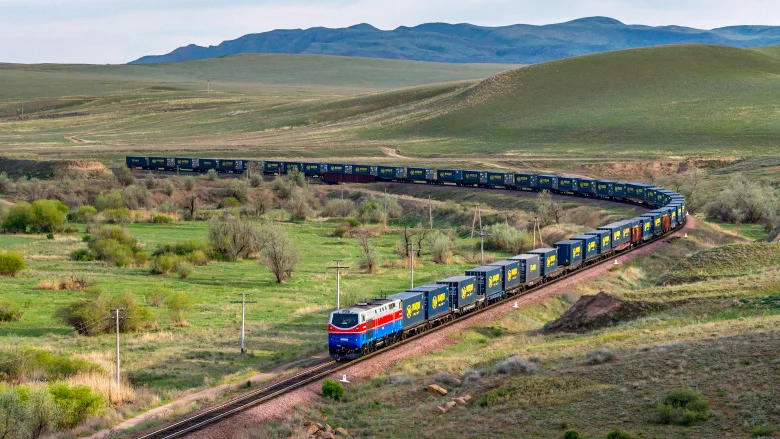Today, Gabala, Azerbaijan, will host the 12th Summit of the Organization of Turkic States (OTS), centered on the theme of “Regional Peace and Security.” The Middle Corridor holds particular significance for OTS member states as a vital transport artery that facilitates the acceleration of international trade, fosters deeper economic integration, modernizes transport and logistics infrastructure, and reinforces strategic cooperation across the region.
The Middle Corridor is crucial for OTS countries not only as a transit route but also for economic integration, boosting international trade, and modernizing transport and logistics infrastructure, a source at Uzbekistan’s Ministry of Transport told Trend.
"According to the World Bank, the Asian Development Bank, and the European Commission, by 2030, freight traffic along the Middle Corridor is expected to reach 10–11 million tons per year. In the current global geopolitical context after 2022, the Middle Corridor has gained special significance as an alternative to the Northern Route," the source explained.
In recent years, OTS countries have implemented large-scale projects to develop the Middle Corridor, with Uzbekistan playing a leading role in this process. "The country is actively establishing and expanding logistics centers, strengthening international rail connections, and beginning practical implementation of the China–Kyrgyzstan–Uzbekistan railway project, which holds strategic significance for the entire Eurasian region," the ministry added.
Experts estimate that the new railway line will become the shortest route from China to Europe and the Middle East, reducing the transport distance by approximately 900 kilometers and cutting delivery times by 7–8 days, bringing significant economic benefits for all participants.
"In addition, Turkmenistan and Uzbekistan are working to fully utilize the potential of the Turkmenbashi International Seaport and the international multimodal route CASCA+ (Asia-Pacific countries – China – Kyrgyzstan – Uzbekistan – Turkmenistan – Azerbaijan – Georgia – Europe). In particular, railway transport along this route now enjoys discounts of up to 70 percent," the ministry representative added.
The ministry also noted that the development of the Middle Corridor is enshrined in the “Turkic World Vision - 2040” concept, adopted at the OTS Summit in Istanbul in 2021. Key priorities include harmonizing tariff policies, simplifying customs procedures, introducing digital transport systems, and expanding multimodal transport capabilities.
"A notable example of digitalization in transport processes was the introduction in 2021 of electronic permit exchanges between Uzbekistan and Türkiye via the E-permit platform. Today, this electronic exchange system is operational across all OTS member states," the ministry highlighted.
The Ministry underscored the Middle Corridor’s critical significance to the member states of the Eurasian Economic Union, highlighting its dual role as both a vital transport and communication artery and a strategic geo-economic platform. This corridor enables the region to serve as a pivotal node in the Eurasian trade network, fostering investment inflows, generating employment opportunities, and enhancing tourism and cultural exchanges.
"Clearly, the sustainable development of the Trans-Caspian route will enhance both the economic and political influence of the Turkic world, positioning it as a key hub on the global transportation network," the source concluded.







